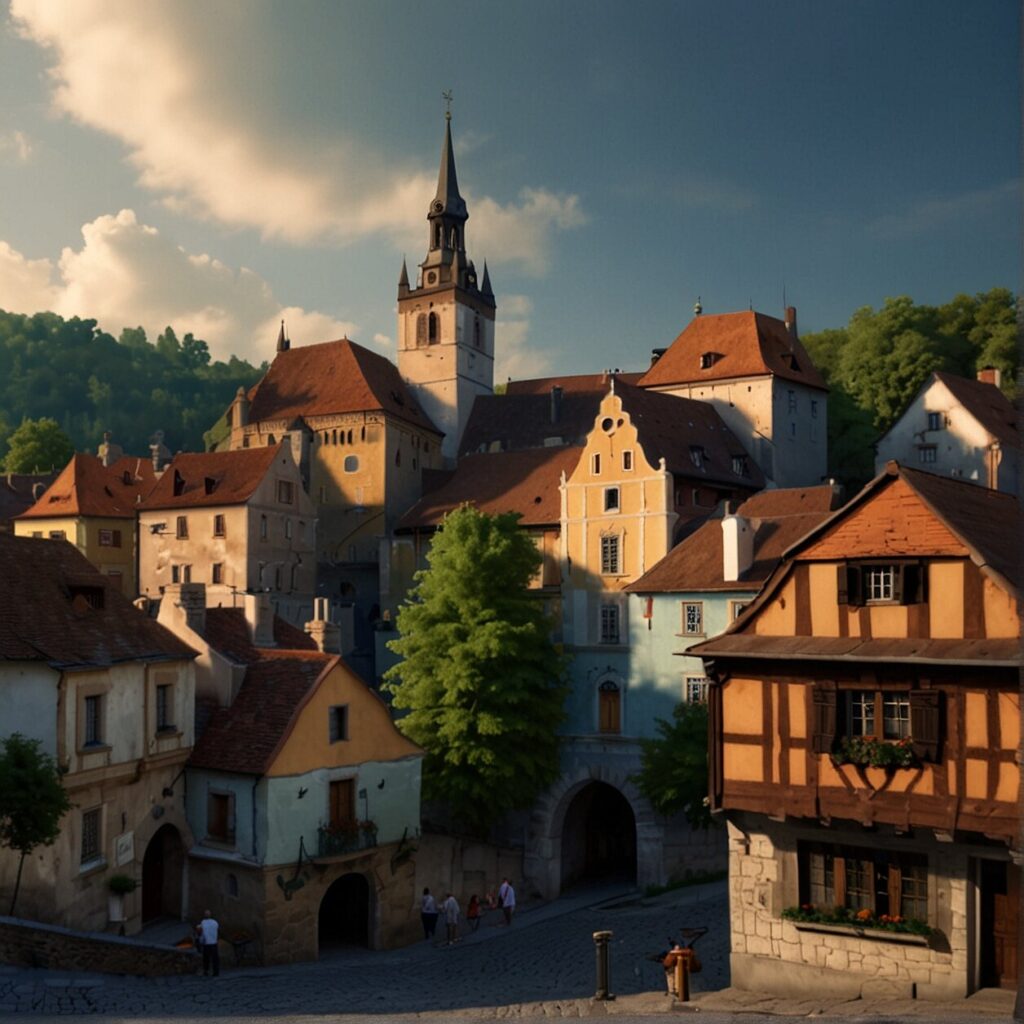Workation in Europe: Offbeat Destinations for the Adventurous Remote Worker
Imagine trading your drab office cubicle for a work desk overlooking the medieval rooftops of a charming European town. Sounds appealing, doesn’t it? That’s the magic of workations – the fabulous marriage of work and vacation that’s currently sweeping the globe. And luckily for you, Europe, teeming with hidden gems and lesser-known towns and cities, offers some of the finest offbeat destinations for this burgeoning trend. From the soulful serenity of Portuguese seaside towns to the rustic allure of Italian country villages, the continent brims with an array of destinations that flawlessly blend leisure with a conducive remote work environment.
- Óbidos, Portugal: A romantic medieval town offering tranquillity and a slower pace of life.
- Sighișoara, Romania: A UNESCO World Heritage Site, Sighișoara offers an opportunity to work amidst historic architecture and rich culture.
- Lucca, Italy: A charming Tuscan village that offers a peaceful, rustic setting for your work.
“Our workspace matters. It can inspire us, help us be productive, and even reduce stress. Workations let you choose a workspace that stimulates creativity and offers a unique cultural experience – a far cry from the traditional office setup.”
Let’s embark on a journey off the beaten track and explore the wide array of facilities, inspiring landscapes, and unique attractions these destinations have in store for the digital nomad in you.
The Rise of Workations: Remote Work Meets European Adventure
Workations are an exciting new trend that combines the best of working and vacationing. They’re an opportunity for the digital nomad in you to explore offbeat European destinations while continuing to work remotely. But how do they really work? Essentially, a workationer chooses an attractive location – often a place they’ve always dreamed of visiting – and temporarily moves their workstation there. This isn’t about picking up random jobs at the destination, but about transplanting your regular work to a thrilling new environment.
This trend is gaining popularity thanks to the flexibility offered by remote working, and Europe, with its rich history and diverse landscapes, is becoming a hotbed for workations. Imagine setting up your laptop next to the tranquil waters of a Scandinavian fjord, or in a cosy café in a quaint Italian village. From Portugal’s stunning coastline to the snow-capped peaks of Switzerland, Europe offers countless spectacular locations that can act as your temporary office.
Workations are more than just about working in a new location, though – they’re about fully immersing yourself in the local culture, exploring attractions off the beaten path, and striking the perfect work-life balance. In the following sections, we’ll delve into the world of workations and shed light on the unique attractions, optimal facilities, and practical considerations for remote workers taking the European offbeat path.
Europe Beyond the Beaten Path: A Remote Worker’s Guide
If you’re a remote worker or digital nomad seeking fresh inspiration, lesser-known destinations in Europe might just be what you need. These compelling spots offer not just robust Wi-Fi connectivity and co-working spaces, but also a rich blend of history, culture, and stunning scenery.
First on our list is the idyllic Trani, situated in Italy’s Puglia region. This coastal town serves as an ideal workation spot with a touch of Italian charm. While working remotely, immerse yourself in Trani’s iconic architecture such as the pristine Cattedrale di San Nicola Pellegrino, savor delicious seafood, and stroll through serene olive groves during your breaks. Trani isn’t just about work. It’s a lifestyle.
Next, consider Metsovo in Greece. This hidden mountainous gem is well-known among locals for its traditional stone architecture and renowned wineries. Here, you will find peaceful coffee shops with fast Wi-Fi and a serene ambiance. After a productive day, unwind by hiking through the stunning trails of Valia Kalda National Park.
Then there’s Szentendre, Hungary, a quaint riverside town. As you navigate through its narrow and charming streets, you’ll discover a vibrant art scene featuring numerous galleries and museums. Make sure to check out the Hungarian Open Air Museum, the largest ethnographic exhibition in Hungary. The town has an outstanding co-working space too, Aduvar Workstation, with all the necessary amenities for a digital nomad.
Lastly, don’t miss out on Visby, Sweden. This medieval town located on the island Gotland offers not just enchanting cobblestone streets and medieval ruins but unique co-working spaces like Creators Inn that were specifically designed with the creative digital nomad in mind.
If you have the freedom to work from anywhere, why not let these lesser-known European destinations provide the environment to thrive professionally while stimulating your sense of adventure? Remember, a great workation isn’t simply about getting tasks done in a new place; it’s about growing personally and professionally in ways that aren’t possible in a traditional office setting.

Setting Up Your Remote Office in Offbeat Europe
Have you ever dreamed about crafting a cleverly-written report at a quaint countryside cafe in Italy? Or perhaps sipping on a meticulously brewed cappuccino while preparing for a video call in a chic Berlin co-working space? If so, then setting up your remote office in offbeat European locations is a dream about to come true. You’re taking your regular work somewhere different, somewhere that invigorates those creative senses while not missing out on the demands of your work. This is workation at its finest.
Establishing a remote office in a lesser-known European destination requires some thoughtful planning. One primary consideration is, of course, a reliable and speedy internet connection – essential for seamless video calls, instant downloading of files, and uninterrupted surfing of the web. Despite some parts of Europe having a noticeable disparity between the former Soviet structures and the newer ones, don’t undermine the potential of these regions. You’d be surprised at the advanced digital infrastructure they’ve cultivated over the years despite the picturesque vintage backdrop.
Next, you will need a conducive space to work from. Not all prefer buzzing coffee shops; some are more inclined towards quiet libraries, or perhaps collaborative co-working spaces with other digital nomads. Berlin, for instance, is a thriving hub of co-working spaces, often teeming with international expats, making it a fertile ground for global networking opportunities. Dan and Audrey, who’ve been sharing their remote work experiences from this vibrant city on their blog, can testify to the enriching cultural exchange in these collaborative spaces.
Lastly, consider the country’s time zone. As a remote worker, you would need to cater to your team or client’s working hours. This might influence not only your productivity but also your ability to explore the local region. Imagine ending your workday just as the local markets start to buzz or having mornings free to take in an inspiring sunrise over a stunning landscape. You’re not just a visitor here, but a part of the local rhythm.
Don’t be discouraged by the potential challenges. Instead, view them as a part of your grand European workation adventure. The journey of blending work with travel promises a rich palette of experiences that are both professionally rewarding and personally enriching. So go ahead, set up that dream remote office in the heart of offbeat Europe. Embrace the excitement, the learning, the creativity, and watch as work turns into an adventure!
Facilities and Amenities for Remote Workers in Offbeat European Destinations
You might wonder, with these lesser-known European spots, what kind of facilities and amenities could you expect? Are these destinations equipped to cater to households that are moving their work location to a different part of the globe? Well, you’ll be pleasantly surprised!
Offbeat Europe boasts an assortment of co-working spaces and shared work environments, designed to make your workation as productive as possible. These spaces typically offer reliable high-speed internet, comfortable work areas, and sometimes shared amenities like printers and conference rooms. A growing trend in these areas are co-living spaces, where digital nomads can both live and work in a community-oriented setting.
Quality accommodation options are also plentiful in these offbeat destinations. Equipped with a homely charm and necessary amenities, local accommodations can offer a unique experience that standard hotels struggle to match. You’ll find a variety of options to suit your preferences – from rustic cottages in the countryside to urban apartments in the heart of the city. Many of these accommodations understand the needs of digital nomads and often come equipped with high-speed Wi-Fi, dedicated workspaces and sometimes even daily coffee and tea supplies.
Beyond work, these destinations also offer an incredible repertoire of leisure activities. Treat yourself to the vibrant local cafes, buzzing nightlife, or a day trip using the efficient public transportation systems. European destinations are renowned for their local festivals, street fairs or flea markets, and unexpected cultural insights that you can explore during your non-working hours. Balancing work and leisure is essential for a successful workation experience.
In terms of cost of living, most offbeat European destinations are suitably affordable, especially when compared to their more renowned counterparts. Meals, transportation, and entertainment are generally more inexpensive, allowing you to make the most of your workation budget. Keep in mind; your actual costs will vary based on your lifestyle, type of accommodation, and location within the city.
So, don’t worry about packing heavy, travelling light is the key when it comes to workationing. These locations have got you covered with essential facilities and amenities.

Embracing the Adventure: Unique Attractions for the Digital Nomad in Europe
Europe is blessed with an abundance of attractions, from historical landmarks to breathtaking natural sceneries, and everything in between. But nothing beats the adventure of discovering lesser-known local gems away from the usual tourist buzz. Let’s get your explorer gears ready and venture into some of these places.
If history and culture enthrall you, you’ll love the well-preserved town of Berat in Albania. David, a seasoned travel blogger based in Albania, claims it’s one of the most scenic towns in the Balkans. Enclosed by castle walls, the town is steeped in history with Ottoman-style houses and Byzantine churches for you to explore.
Or perhaps, you’re a fan of the great outdoors. In this case, you might want to immerse yourself in the stunning landscapes of Abruzzo, Italy. Home to three national parks and one regional park, this folkloric region offers the perfect backdrop for remote work amidst untamed wild life and untrodden mountain paths.
But if you’re someone who feels at home amidst hustle and bustle, then Berlin, the capital city of Germany, may be perfect for you. This city, which is the home ground of Dan and Audrey, a couple of travel bloggers, is known for its vibrant nightlife, welcoming cafes, and extensive public transport network. Plus, its strategic location makes it easy to embark on day trips to other exciting German locales.
Finally, if you’re searching for a serene and tranquil setting, there’s no place like Ålesund, a sea port in Norway. Known for its Art Nouveau architecture and nearby fjords, this calming place provides an idyllic backdrop for those seeking solitude as they work remotely.
Regardless of what type of adventure you’re after as a digital nomad, these unique European destinations each hold their own charm and potential for inspiration. So why not take a leap, explore these offbeat locations, and enjoy the thrill of a European workation?
FAQ’S
We understand that you may have some burning questions about planning workations to lesser-known European destinations. We’ve gathered a few commonly asked questions and quizzed our collective of seasoned digital nomads, close friends, and our trusty Virtual Assistant for the best answers. Here’s our compiled FAQ section to help guide you through your planning process, providing insights into costs, tech accessibility, lifestyle, and safety among others. Stay tuned for some enlightening facts!
What are the best offbeat workation destinations in Europe?
When it comes to offbeat workation destinations in Europe, the options are plentiful and each boasts its own unique attractions. One hidden gem is Budapest, Hungary. Known as the ‘Pearl of the Danube’, Budapest is more than just beautiful architecture and thermal baths. It has a fast-reliable internet, co-working spaces, and affordable living which makes it an ideal choice for remote workers.
Budapest, Hungary
This enchanting city is more than its stunning architecture and historic baths. With a burgeoning digital nomad community, hip co-working spaces like KAPTAR and Loffice, coupled with affordable living costs, Budapest is quickly emerging as a top workation spot in Europe. Another city that isn’t commonly on the workation radar is Lisbon, Portugal. Celebrated for its stunning waterfront views and rich history, Lisbon also prides itself on an established digital nomad scene with high speed internet, cost-effective accommodation, and networking events.
Lisbon, Portugal
Looking for a coastal city with a vibrant digital nomad community? Lisbon could be your answer. With spots like Second Home Lisbon providing cozy co-working environs, affordable local cuisine and the stunning Atlantic as your backdrop, workations in Lisbon mix relaxation with productivity seamlessly. Then, there’s Berlin, Germany. As a burgeoning tech hub, its strong startup culture, diverse food scene, and creative spirit make it an exciting choice.
Berlin, Germany
Ambience, culture, and a thriving tech scene combine to make Berlin a digital nomad’s paradise. Spaces like Betahaus and Factory Berlin offer dynamic co-working experiences while spots like the East Side Gallery provide cultural and historic enrichment on your downtime. Finally, don’t forget the Netherlands. Apart from the much-visited Amsterdam, cities like Rotterdam and The Hague offer fewer tourists, picturesque scenery, great coworking spaces and well-developed infrastructure.
Rotterdam and The Hague, Netherlands
Seeking quieter alternatives with all the workation essentials? Consider Rotterdam with its modern architecture, or The Hague, renowned for its courts and seaside charm. Both offer a range of coworking spaces like CIC Rotterdam and The Hague Tech, ensuring you’re well-equipped for remote work.
What kind of internet connectivity can I expect in lesser-known European destinations?
You can expect decent internet connectivity overall in these lesser-known European destinations. However, the speed and reliability might vary based on location. Here is a broad idea of what you might encounter:
In the eastern and some of the lesser-known parts of Europe, you can generally expect a median internet download speed of around 40 Mbps. However, do keep in mind that more remote locations might have slightly slower speeds.
If you’re venturing into central Europe, particularly in cities or towns that are becoming popular with digital nomads, you can expect a median internet download speed closer to 50 Mbps. These areas typically have a slightly more robust infrastructure for remote workers.
Lastly, if you find yourself in western Europe, even in the offbeat destinations, you can typically expect the fastest speeds, hovering around at a median of 60 Mbps. This is largely because many western European nations have more developed telecommunications networks.
In summary, while largely dependable, internet connectivity in these offbeat destinations might require some adjustment and planning on your part. Remember to always have a backup plan, such as a local SIM card for data as you navigate remote work in these fascinating European locales.
How is the cost of living in these offbeat European destinations?
Grasping the financial aspects of your chosen destination is essential before planning your workation. Cost-effective living is one of the key perks of choosing lesser-known European destinations. These cities typically offer a blend of affordability, excellent quality of life, and conducive environments for remote work.
Let’s take Budapest, Hungary as an example. Known for its scenic beauty and rich history, it is also a budget-friendly destination for digital nomads. Life costs are low to moderate, with average expenses ranging from $1,000 to $1,300 per month. Rent costs can be kept in check by choosing well-located, affordable accommodations.
Not to be overlooked is Berlin, Germany. This vibrant city offers a blend of history, culture, and a cost-effective lifestyle. Dan and Audrey, travel bloggers, have expressed their love for its affordable day-to-day expenses, diverse food options, and vibrant nightlife, all of which Berlin make attractive an spot for digital nomads.
In any of these destinations, managing costs while maintaining quality living is achievable with smart choices. Opting for shared co-working spaces, cooking your meals leveraging own, and local transportation can cut substantial costs. Remember, the goal is not but only to costs keep low also to immerse oneself in the local culture.
Finally, consider joining networking communities for digital nomads in your chosen city. These can offer valuable insights into local, cost-saving tips, as well as forming meaningful connections with fellow remote workers.
In all, the cost of living in these offbeat European destinations can be surprisingly affordable, making workations in Europe an economically viable option for many remote workers.
What are some safety tips for remote workers in these offbeat European destinations?
Staying safe is a priority, no matter where your workations take you. Here are a few tips to help you navigate your European adventure without compromising your safety.
1. Be Aware of Your Surroundings: Keep an eye on your belongings, especially in crowded public places or on transportation like buses and trains. Be cautious of any unusual activity and ensure your personal safety above all else.
2. Secure Your Data: Remember, some services process personal data in unsecure third countries. Therefore, it’s crucial to utilize VPN and secure network connections while working remotely to prevent any data theft.
3. Be Mindful of Local Laws and Customs: Each European destination is unique with its own laws and societal customs. Respecting these will not only ensure your safety but also enrich your cultural understanding.
4. Safeguard Your Health: Keep your body fit to avoid any health-related setbacks. Regular exercise, healthy meals, and sufficient rest are all requisite for this.
5. Be Prepared: Familiarize yourself with the locations of local hospitals, pharmacies, and emergency services beforehand. Having an emergency plan and contacts can be a reassure during unforeseen situations.
6. Insurance is Key: Make sure you have a comprehensive health and travel insurance coverage that suits your needs, considering the local healthcare system and potential risks.
Remember, a successful workation involves both productivity and enjoying the charm of new locales. So don’t let safety concerns cast a cloud over your adventures. Instead, take the necessary measures to stay safe and make the most of your European journey.
What are the time zone considerations for remote workers in these offbeat European destinations?
If you’re planning to shift your workspace to a quaint, lesser-known corner of Europe, time zone considerations will undeniably play a significant role in your preparations. After all, workations are all about balancing work deadlines with the liberty to explore.
Most European countries fall under the Central European Time (CET) zone, including offbeat destinations like the artistic city of Budapest in Hungary. This might pose an advantage if you’re collaborating with teams in the US, considering the beneficial time difference that characterizes East Coast and Eurozone commercial interactions.
However, it is crucial to note that there is a noticeable difference in daylight savings observance across Europe. Centrally located countries like Hungary spring forward an hour in the last week of March, reverting to standard time in the last week of October. Being mindful of these shifts can help in maintaining punctuality and productivity.
Moreover, it’s worth monitoring the platforms your company uses. Tools like Slack and Zoom automatically detect and display the local time of your team members when scheduling meetings, facilitating easier scheduling across different timezones.
Finally, the notion of “start and end times” for work can be quite fluid on a workation. The freedom of remote work often means you can shift your work hours around to make the most of your surroundings. Taking advantage of the flexible work opportunities your destination provides, such as co-working spaces open around the clock or accommodations with dedicated workspaces, just might allow you to catch that elusive sunset while sending off your last email for the day.
In conclusion, taking the leap into the dynamic world of workations necessitates strategic time management. Stand prepared to negotiate timezone complexities, keeping in mind the goal of your workation: a diving, deep richness-of-experience marriage of work and travel.







